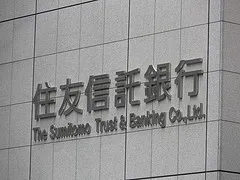
Japanese megabanks suffer from biggest swap declines after downgrade
Moody’s reduction to the country’s debt grade was the first in nine years.
The cost of insuring Japan’s largest lenders’ bonds is falling more than for any domestic company after the Moody’s Investors Service downgrade of the nation’s credit rating sent bank credit-default swaps to a record, according to a Bloomberg report.
The top banks occupied five of the six biggest swap declines last week, according to a Bloomberg ranking of derivative price changes from data provider CMA. Five-year contracts covering subordinated bonds of Sumitomo Mitsui Financial Group Inc.’s main banking unit dropped 48 basis points in the five days ended Sept. 2 to 277.5 basis points. By comparison, swaps for JPMorgan Chase & Co. subordinated debt rose to 125 basis points from 118.5 last week.
Debt ratings for Mitsubishi UFJ Financial Group Inc., Sumitomo Mitsui and Mizuho Corporate Bank Ltd. were cut one step by Moody’s on Aug. 24 following its downgrade of Japan to Aa3 from Aa2, reflecting reduced government support in a crisis scenario. The banks’ debt risk fell last week on optimism a 20- month slide in Japanese loan demand will reverse in the fiscal year ending in March, analysts said.
“Traders and investors seem to have shrugged off Moody’s downgrade on megabanks because the action was largely in line with their Japan sovereign downgrade,” said Katsuhito Sasajima, a Tokyo-based bank analyst at JPMorgan Chase. “Lending demand will see year-on-year growth around November as Japanese companies use the strong yen to acquire and relocate overseas. With billions of dollars of buyouts out there, the financing requirements will follow.”
‘Extreme Stress’
The main lending unit of Mitsubishi UFJ was cut to Aa3, the fourth-highest investment grade, as was Sumitomo Mitsui Banking. Mizuho’s two banking units were lowered to A1, the fifth highest. They remain on review for further downgrade, Moody’s said last month.
“There is an increasing risk that the government’s capacity to provide support to banks in a future crisis has diminished,” the ratings company said in a statement. “Under conditions of extreme stress, the authorities will become increasingly selective in their distribution of support, with a bias in favor of the most systemically important banks.”
The reduction to Japan’s debt grade was the first by Moody’s since 2002 and reflected deteriorating credit quality across developed nations from Italy to the U.S., which lost its AAA status at Standard & Poor’s this month.
Spreads Flat
The extra yield investors demand to own corporate bonds of Japanese banks instead of similar-maturity government debt was unchanged at 45 basis points on Sept. 2 from the day before Moody’s industry downgrade and little changed from a year ago, according to Bank of America Merrill Lynch indexes. Spreads on U.S. bank debt were at 254 basis points on Sept. 2.
Credit risk on Mizuho, Mitsubishi UFJ and Sumitomo Mitsui began rising in early August as sovereign credit concerns throughout Europe increased and the region’s financial leaders urged the speedy approval of the euro-area rescue fund. Last week, default swap prices dropped 47 basis points for Mizuho Corporate and Mitsubishi UFJ shed 36 basis points.
Japanese banks at the end of March held $1.3 billion in Greek debt compared with $15 billion held by U.K. banks and $8.7 billion held by U.S. banks, Bank for International Settlements data published in July. Japanese lenders’ holdings of Spanish debt totaled $25 billion compared with $101 billion and $58 billion in the U.K. and U.S. respectively.
’Less Exposure’
“Megabanks learned a lot of lessons from the subprime crisis and the Asian financial turmoil in late 1990s, that’s helped them stay less exposed to European sovereign debts and allowed them to fend off offshore risks,” JPMorgan’s Sasajima said.
The average price of five-year credit-default swaps for subordinated debt of the three megabanks, Japan’s largest by market value, climbed to 329 basis points on Aug. 25, the day after the Moody’s downgrade, from 200 basis points on Aug. 4. Protection for senior and subordinated debt of 197 global banks rose to an average 360 basis points from 293.
The yen’s 9.8 percent gain against the dollar in the past 12 months and recent moves among Japanese companies to expand overseas amid stagnant domestic growth will boost borrowing demand after almost two years of declines, Sasajima said.
He cites the lift lending received five years ago amid a surge in acquisitions including Softbank Corp.’s 1.45 trillion yen deal purchase of Vodafone K.K. and Toshiba Corp.’s Westinghouse Electric Co. deal worth $5.4 billion.
Lending grew 1.1 percent in 2006 as companies tapped bank loans and corporate bonds to finance their buyouts. Nippon Sheet Glass Co. also completed a 1.8 billion pounds acquisition of Pilkington Plc that year.
Photo from Canadian Pacific



















 Advertise
Advertise












